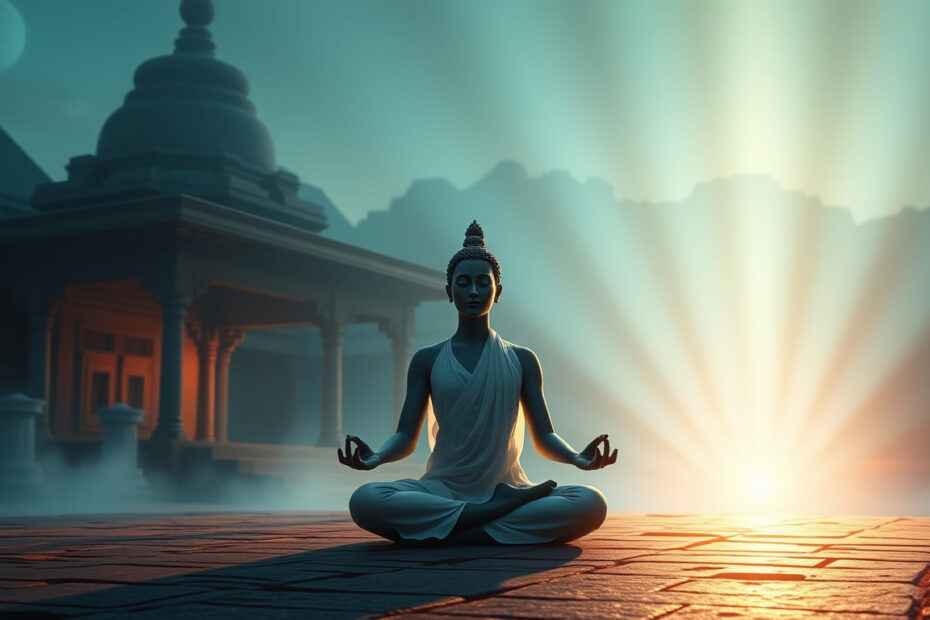🌟 Daily Awakening Quiz 🌟
The pursuit of spiritual freedom has been a timeless quest for countless individuals across cultures and centuries. Central to this profound journey in Indian philosophy is the concept of moksha—the ultimate liberation from the cycle of birth, death, and rebirth (samsara). If you have ever wondered what moksha truly means and how one can attain this supreme state of freedom, this comprehensive guide will walk you through the essentials of moksha mastery. By understanding the nature of moksha, its significance, and practical steps towards achieving it, you can unlock a life of profound peace and eternal bliss.
What Is Moksha?
The term moksha originates from the Sanskrit root "muc," meaning "to free" or "to release." Moksha signifies liberation from the endless cycle of reincarnation and the suffering linked to worldly attachments, desires, and ignorance (avidya). It is regarded as the ultimate goal in Hinduism, Jainism, and certain schools of Buddhism, embodying spiritual freedom and the realization of one’s true self (Atman) or unity with the absolute reality (Brahman).
Unlike temporary happiness from material pleasures, moksha represents a permanent state of eternal bliss, knowledge, and freedom from all limitations of the physical world. Achieving moksha means that the soul no longer experiences sorrow, fear, or death, having transcended all worldly ties.
The Importance of Moksha in Spiritual Practice
Moksha holds a place of paramount importance since it addresses the core human predicament of suffering and mortality. While various religious and philosophical traditions propose different paths, the underlying purpose is often the same: to realize our true nature beyond physical existence.
In Hindu philosophy, the Bhagavad Gita—a cornerstone scripture—emphasizes moksha as the highest aim of human life, urging seekers to rise above attachments, desires, and ego to reach self-realization (source). Similarly, Jainism teaches moksha as liberation attained by purifying the soul through ethical living and self-discipline.
Understanding moksha empowers seekers to prioritize spiritual growth over transient pleasures, setting the stage for a meaningful, purpose-driven life.
Four Paths to Achieving Moksha
Historically, Indian philosophy outlines four primary yogic paths (margas) leading to moksha. These paths cater to different temperaments and inclinations, enabling seekers to select an approach that resonates deeply with their nature.
1. Jnana Yoga (Path of Knowledge)
Jnana yoga emphasizes intellectual inquiry and self-inquiry. Through deep study of sacred texts, meditation, and contemplative practice, aspirants discern the difference between the real (Brahman) and the unreal (Maya or illusion). This path requires sharp wisdom and discernment to break the chains of ignorance that bind the soul.
2. Bhakti Yoga (Path of Devotion)
This path is dominated by love and devotion towards a personal deity or divine principle. Devotees cultivate surrender, reverence, and emotional connection through prayer, chanting, and ritual worship. Bhakti yoga dissolves the ego and fosters unity with the divine through heartfelt worship.
3. Karma Yoga (Path of Selfless Action)
Karma yoga involves performing duty and righteous action without attachment to results. By dedicating every act to the divine and acting selflessly, practitioners purify their minds and reduce egoistic tendencies that cause rebirth and bondage.
4. Raja Yoga (Path of Meditation)
Known as the royal path, Raja yoga focuses on disciplined control of the mind and body through meditation, breath control (pranayama), and ethical living. It aims to still the fluctuations of the mind (chitta vritti) and realize the timeless self.
Practical Steps Toward Moksha Mastery
While moksha is a profoundly spiritual concept, its pursuit involves concrete practices that cultivate wisdom, purity, and liberation. Here’s a roadmap that seekers can adapt:
- Self-Reflection and Study: Begin by learning scriptures like the Upanishads, Bhagavad Gita, and philosophical texts that explain moksha. Journaling your insights can deepen understanding.
- Meditation Practice: Daily meditation fosters mindfulness and detachment. Even 10–15 minutes per day can help you connect with your inner self.
- Adopt Ethical Living: Embrace virtues such as non-violence (ahimsa), truthfulness (satya), non-stealing (asteya), and control of desires.
- Serve Others Selflessly: Karma yoga integrates action with spiritual growth. Volunteer or help others without expectation of reward.
- Cultivate Devotion and Gratitude: Prayers, chanting mantras, and devotional activities feed the heart with love and surrender.
- Seek Guidance: Connect with a spiritual teacher or community to refine your practice and receive support.
- Maintain Detachment: Practice letting go of attachments to possessions, outcomes, and identities.
The Role of Mindfulness and Inner Awareness
Central to mastering moksha is heightened awareness of the present moment and recognition of one’s divine essence beyond the physical form. Mindfulness strengthens your capacity to observe thoughts, emotions, and impulses without identification, which is crucial for transcending ego and illusion.

Developing this awareness also helps dismantle the illusions of duality and separation, enabling a direct experience of oneness with all creation—a key moksha realization.
Common Misconceptions about Moksha
It’s vital to clarify some common misunderstandings that may hinder your journey toward spiritual freedom:
- Moksha is only achievable after death: While final liberation may culminate after physical death, glimpses or partial experiences of moksha can manifest during life.
- Moksha means renouncing the world entirely: True moksha involves freedom from attachment, which does not necessarily require physical renunciation but mental detachment while living in the world.
- Only saints or ascetics can attain moksha: Anyone committed to the path with sincerity, regardless of social status or profession, can work towards moksha.
- Moksha is identical in all religions: Interpretations vary; however, the common theme is liberation from suffering and realization of ultimate truth.
Moksha in Modern Life: How to Integrate Spiritual Freedom Today
In today’s fast-paced and material-driven world, the idea of moksha may seem distant or abstract. Nonetheless, its principles are highly relevant for modern seekers craving peace, purpose, and fulfillment.
By practicing mindfulness and detachment, you can reduce stress and anxiety. Ethical living contributes to a more harmonious society. Selfless service nurtures empathy and connection. Devotion or meditation offers emotional resilience.
Make spiritual freedom a daily priority by:
- Creating a dedicated meditation space.
- Balancing worldly responsibilities with spiritual practices.
- Surrounding yourself with like-minded individuals.
- Reflecting regularly on your life’s higher purpose.
Frequently Asked Questions About Moksha
Q1: What is the difference between moksha and nirvana?
A: Moksha typically refers to liberation in Hinduism and Jainism—freedom from samsara and union with Brahman—while nirvana in Buddhism is the extinction of desire and suffering. Both signify spiritual liberation but differ in doctrinal details.
Q2: Can moksha be achieved through meditation alone?
A: Meditation is a critical tool but generally needs to be complemented by knowledge, ethical living, and detachment for complete moksha mastery.
Q3: How long does it take to achieve moksha?
A: The timeline varies individually; moksha is a lifelong pursuit, sometimes spanning multiple lifetimes, depending on one’s dedication and spiritual maturity.
Conclusion: Embark on Your Journey to Moksha Mastery Today
Unlocking the profound spiritual freedom that moksha offers is a transformative journey of inner exploration, dedication, and love. By integrating ancient wisdom with practical steps in your life, you can transcend limitations and experience unshakable peace and joy. Remember, moksha is not a distant dream reserved for a select few but a possibility for every sincere seeker.
Begin your journey today by embracing mindfulness, ethical living, and selfless service. Seek knowledge, cultivate devotion, and refine your awareness. With patience and perseverance, the ultimate liberation of moksha will radiate as a guiding light illuminating your path to spiritual mastery.
Ready to take the first step toward unlocking your spiritual freedom? Dive deeper into the teachings on moksha and start transforming your life from within.
